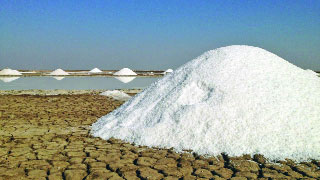Locally produced packaged salt lacks iodine: Study
Industry Desk: All brands, especially local ones, do not maintain the amount of iodine in salt determined by the Bangladesh Standards and Testing Institute (BSTI), finds a study conducted by a group of researchers from Noakhali Science and Technology University and Dhaka University.
The study titled “Commercially available iodised salts in Noakhali, Bangladesh: Estimation of iodine content, stability, and consumer satisfaction level’’ says that although government initiatives have decreased iodine-deficient illnesses, iodine loss in salt also needs to be addressed to avoid potential health hazards, especially for rural pregnant women.
“Attention needs to be paid to the loss of iodine content in packaged salt resulting from humidity and high temperature,” adds the study published in Food Chemistry Advances journal on 9 May.
The study was conducted on a total of four samples from seven branded salts collected from local retailers in Subarnachar Upazila of Noakhali. Concentration of iodine and its stability in different brands were evaluated using iodometric titration.
The study findings show that salt from three brands had iodine content of more than 20ppm, and one brand contained a very low amount of iodine, only 10.65ppm. According to BSTI, a salt brand should contain around 20-50ppm of iodine to be acceptable as iodised salt.
Mohammad Asadul Habib, author of the study and lecturer at the Noakhali Science and Technology University told, “Out of the seven brands, we have done the research on four brands of salt that people mostly consume in Noakhali. Salts of local brands and company ones were among these. Local brand salts are most deficient in iodine, which are used more by the people here due to the low price”.
The study emphasised that care should be taken during the salt manufacturing and packaging process, distribution, and storage conditions at the household level to ensure adequate intake of iodine.
Iodine deficiency can lead to a variety of health and developmental consequences known as iodine deficiency disorders.
According to Unicef, iodine deficiency is especially damaging during pregnancy and in early childhood. It can lead to cretinism, stillbirth and miscarriage; even mild deficiency can cause a significant loss of learning ability.
Dr Shahjada Selim, associate professor at the dept of endocrinology of BSMMU, told that Bangladesh is one of the countries with the highest prevalence of thyroid disorders, with 20% of its population believed to suffer from it due to iodine deficiency.
Iodine deficiency is the main reason behind most of the hypothyroidism cases in Bangladesh. Iodine deficiency causes a lack of thyroid hormones, disrupts physical structure, and decreases human IQ, he added.
President Joe Biden tests positive for COVID-19 while campaigning in Las Vegas, has ‘mild symptoms’
International Desk: President Joe Biden tested positive for COVID-19 while traveling Wedne…








